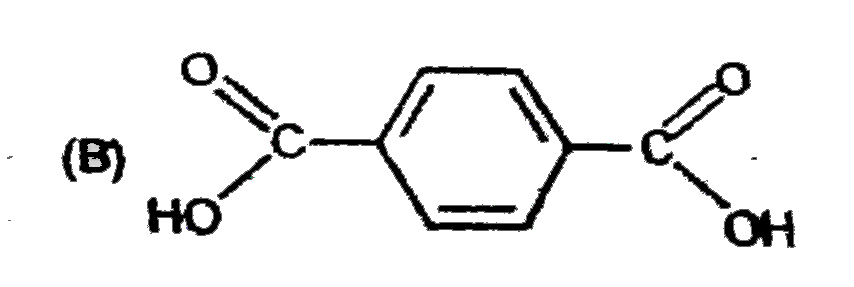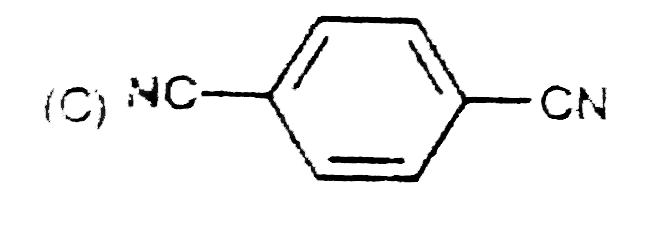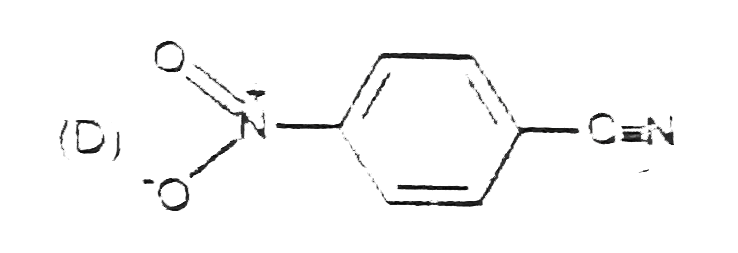The compound with no dipole moment is -
Methyl chloride
Carbon tetrachloride
Methylene chloride
Chloroform
The correct Answer is:B
To determine which compound has no dipole moment, we need to analyze the molecular structures of the given compounds and assess their symmetry and electronegativity differences.
1. Understanding Dipole Moment:
- The dipole moment is a measure of the separation of positive and negative charges in a molecule. It is represented as μ=q×d, where q is the charge and d is the distance between the charges.
- A molecule has a dipole moment if there is an unequal distribution of electron density, often due to differences in electronegativity between bonded atoms.
Hint: Remember that symmetrical molecules often have a net dipole moment of zero due to equal and opposite dipoles canceling each other out.
2. Analyzing Methyl Chloride (CH3Cl):
- Structure: Tetrahedral with one chlorine atom and three hydrogen atoms.
- Electronegativity: Chlorine is more electronegative than carbon, leading to a dipole moment directed towards chlorine.
- Result: Methyl chloride has a net dipole moment.
Hint: Check for asymmetry in the molecular structure; if present, it likely has a dipole moment.
3. Analyzing Carbon Tetrachloride (CCl4):
- Structure: Tetrahedral and symmetrical.
- Electronegativity: All four chlorine atoms are identical, and the symmetrical arrangement means that the dipoles cancel out.
- Result: Carbon tetrachloride has no net dipole moment.
Hint: Symmetrical molecules with identical atoms around a central atom typically have zero dipole moments.
4. Analyzing Methylene Chloride (CH2Cl2):
- Structure: Tetrahedral with two chlorine atoms and two hydrogen atoms.
- Electronegativity: The dipoles from the C-Cl bonds do not cancel out due to the different electronegativities and the arrangement of atoms.
- Result: Methylene chloride has a net dipole moment.
Hint: Look for the number of different atoms and their arrangement; this can indicate whether dipoles will cancel.
5. Analyzing Chloroform (CHCl3):
- Structure: Tetrahedral with one hydrogen and three chlorine atoms.
- Electronegativity: The dipoles from the C-Cl bonds do not fully cancel due to the presence of hydrogen.
- Result: Chloroform has a net dipole moment.
Hint: Consider how many different types of atoms are present and their positions; this affects the overall dipole moment.
Conclusion:
The compound with no dipole moment is Carbon Tetrachloride (CCl4).
- The dipole moment is a measure of the separation of positive and negative charges in a molecule. It is represented as μ=q×d, where q is the charge and d is the distance between the charges.
- A molecule has a dipole moment if there is an unequal distribution of electron density, often due to differences in electronegativity between bonded atoms.
- Structure: Tetrahedral with one chlorine atom and three hydrogen atoms.
- Electronegativity: Chlorine is more electronegative than carbon, leading to a dipole moment directed towards chlorine.
- Result: Methyl chloride has a net dipole moment.
- Structure: Tetrahedral and symmetrical.
- Electronegativity: All four chlorine atoms are identical, and the symmetrical arrangement means that the dipoles cancel out.
- Result: Carbon tetrachloride has no net dipole moment.
- Structure: Tetrahedral with two chlorine atoms and two hydrogen atoms.
- Electronegativity: The dipoles from the C-Cl bonds do not cancel out due to the different electronegativities and the arrangement of atoms.
- Result: Methylene chloride has a net dipole moment.
- Structure: Tetrahedral with one hydrogen and three chlorine atoms.
- Electronegativity: The dipoles from the C-Cl bonds do not fully cancel due to the presence of hydrogen.
- Result: Chloroform has a net dipole moment.
The compound with no dipole moment is Carbon Tetrachloride (CCl4).
Topper's Solved these Questions
- ALKYI HALIDEBook:MOTIONChapter:ALKYI HALIDEExercise:Exercise - 1 (Physical properties and test of Alkyl halide)
Explore 5 Videos
- ALKYI HALIDEBook:MOTIONChapter:ALKYI HALIDEExercise:Exercise - 2 (Level-I) (Prepration of Alkyl halide)
Explore 7 Videos
- ALKYI HALIDEBook:MOTIONChapter:ALKYI HALIDEExercise:Exercise - 1 (Chemical Properties & Preparation methods of Diahlides)
Explore 3 Videos
- ALCOHOLS & ETHERSBook:MOTIONChapter:ALCOHOLS & ETHERSExercise:EXERCISE -4 (LEVEL -II) PREVIOUS YEAR JEE ADVANCED
Explore 9 Videos
- AROMATIC COMPOUNDBook:MOTIONChapter:AROMATIC COMPOUNDExercise:Exercise - 4 | Level-II
Explore 16 Videos
Similar Questions
In the compound PCIkF5−k possible values of k are 0 to 5. Then sum of all possible value of k for the compounds having zero dipole moment is ________ .
View SolutionConsider the following halogen containing compounds
(i) CHCl3 (ii) CCl4
(iii) CH2Cl2 (iv) CH3Cl

The compounds with a net zero dipole moment are
View Solution
Knowledge Check
Which compound shows dipole moment
A1,4-dichloro benzeneB1, 2-dichloro benzeneCTrans-1, 2-dichloro ethaneDTrans-2-buteneWhich compound has zero dipole moment ?
A B
B C
C D
D
which of the following compound has zero dipole moment in one of the stable conformations?
AHO−CH2−CH2−OHBCH3−CHCl−CHBr−CH3C(d or 1)CH3−CHCl−CHCl−CH3Dmeso−CH3−CHCl−CHCl−CH3
The degree of polarity of a convalent compound is measured by the dipole moment (μbond) of the bond defined as:
μbond=Charge on one of the poles × bond length
μbond is a vector quantity. The dipole moment of a molecule is the vector addition of all the bond dipole moments present in it. For a triatomic molecule, containing two bond's like H2O,μmolecule is dipole mements present in it. For a triatomic molecule, containing two bond's like H2O,μmolecule is given by
μ2molcular=μ2bond+μ2bond+2μbond.μbondcosθ
θ= bond angle
The % ionic character of a bond is calculated using the equations
% ionic character =μobsμionic×100
μionic= dipole moment when the molecule is assumed to be completely ionic.
Which of the following compound has non zero dipole moment -
View SolutionWhich of the following compounds have zero dipole moment ?
View SolutionWhich of the following compounds have finite dipole moments ?
View SolutionAmong the following compounds, which has a dipole moment
View SolutionWhich one of the following compounds has non zero dipole moment ?
View Solution

